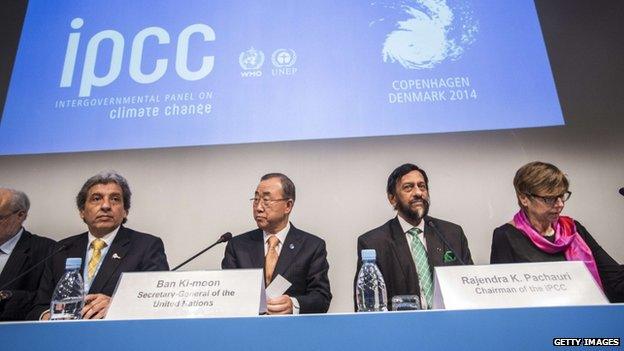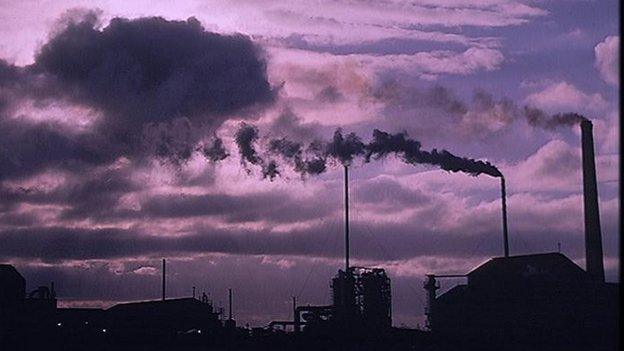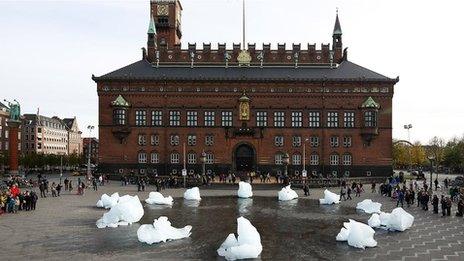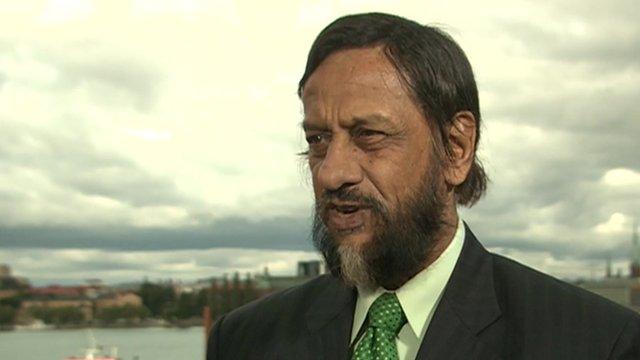Strictly come warming: Swing time at the UN
- Published
- comments

UN Secretary General Ban Ki-Moon launched the IPCC Synthesis Report in Copenhagen
Where would you rather be on a Saturday night?
Watching those familiar faces, admiring the nimble footwork, laughing at the catty comments?
Yes, it's Strictly Come Warming with the IPCC.
Almost literally.
Once the gavel came down and agreement had been reached on the synthesis report, external in Copenhagen last Saturday, the grey faced climate scientists and government officials were treated to a rousing, amateur dance display.
The Fred Astaire and Ginger Rogers act, from volunteers working with the organisation, went down well with the assembled negotiators.
But the long nights revising the text had taken their toll - the wages of synth were widespread swivel-eyed tiredness.
One eminent researcher even slept through the spin doctor's media briefing and as a result had many more interesting things to say to journalists.
Gaining weight
In the end, the published report was quite a chunky document - growing by a whopping 25% in just seven days of discussions.
"More words, less meaning," said one of those involved.
While the main elements of cause, impact and solution remain unchanged from the underlying reports published over the last year, some of the inclusions and exclusions reflect the rise of the political process.
Countries are jockeying for position ahead of negotiations on a new global climate treaty in Paris next year.
Some are better in the saddle than others.
A strange, old school alliance between Saudi Arabia and Bolivia delivered significant changes in some parts of the document.
In a chapter about the characteristics and risks of mitigation pathways, the draft document spoke only of the chances of temperature rises of 2C, and made a cursory mention of temperatures of 1.5 degrees.
But under pressure from the curious Latin American-Saudi coalition, the finished document speaks of 1.5, 2 and even 3 degrees in some detail.
Even more bizarre is a completely new paragraph that begins:
"Mitigation policies could devalue fossil fuel assets and reduce revenues for fossil fuel exporters..."
Then there's the ubiquitous references to carbon, capture and storage (CCS) as being a critical technology if the world wants to keep using fossil fuels.

An act inspired by Fred and Ginger went down well with the negotiators
The current pace of development of CCS in the world has been glacial.
This year saw the first deployment of commercial scale, external carbon capture in Saskatchewan.
"We now have the first power plant in Canada which captures emissions," said Kaisa Kosonen of Greenpeace, speaking in Copenhagen.
"It dumps it into depleted oil fields in order to get more oil out of the ground - clearly it is not really the kind of thing we need to see."
Insiders told me that the Saudi delegation were extremely well prepared for the IPCC meeting.
They had done their homework on the opposition and allies alike.
They were able to convince many smaller countries, without big delegations, that Saudi Arabia would fight for their interests.
This led to the slightly bizarre scenario where a country that by some definitions is as wealthy as the US, Germany and the UK, external, was speaking on behalf of developing nations!
Many of those present ultimately went along with the changes as they believed they didn't water down the overall message and weren't in conflict with the underlying science.
But the Saudis and their allies were playing Danish long ball.
Old divisions
The synthesis report may be the runt of the IPCC litter in terms of size, but it is expected to be a political heavyweight.
The document will be the go-to summary for the UN political negotiators as they move towards Paris.
By having the references to losses expected for fossil fuel producers enshrined in the text, by putting huge emphasis on CCS, the Saudis and others will be able to say at crucial moments that the science backs their position.
And, in a very real sense, it is true.
What was going on behind the scenes in Copenhagen is a reflection of the key difficulty facing those who want to secure a new global climate treaty - what is the ultimate priority for nations?, cutting emissions of carbon or lifting people out of poverty by whatever means necessary?
"I think that is exactly what it is," said Prof Arthur Petersen from UCL and member of the Dutch government's team in Copenhagen.
"It is being played out in the UN convention itself, and also in negotiating what's the relevant scientific information, because the framing counts."
Others believed that the rising influence of developing nations is good for the scientific process, putting some real world experience of climate change in among the models and chart.
Some scientists feel quite strongly that the flexing of developing country muscles is a good thing for the IPCC and ultimately good for the world.
"Politics is everywhere around us and it would be crazy to think we live in a world where science and politics are divorced," said Dr Yacob Mulugetta from Ethiopia, who was one of the IPCC core writing team in Copenhagen.
"What I find quite energising is the fact that sustainable development, the right to develop and equity and justice issue are weaved into this report and with careful reading, those elements will come through."
The circle it seems can be squared.
We'll find out in Lima next month when the UN negotiators start the serious work on a deal.
As Fred, Ginger and the IPCC might say:
"Let's face the music and dance."
Follow Matt on Twitter @mattmcgrathbbc, external.
- Published2 November 2014

- Published30 October 2014

- Published27 September 2013
